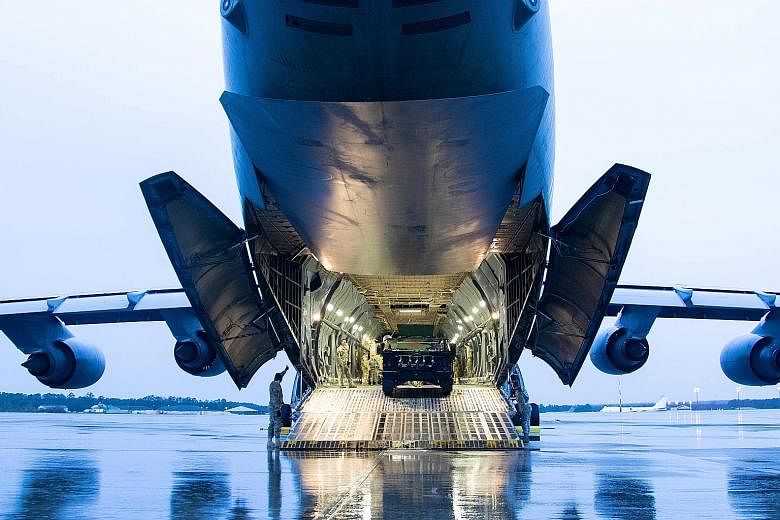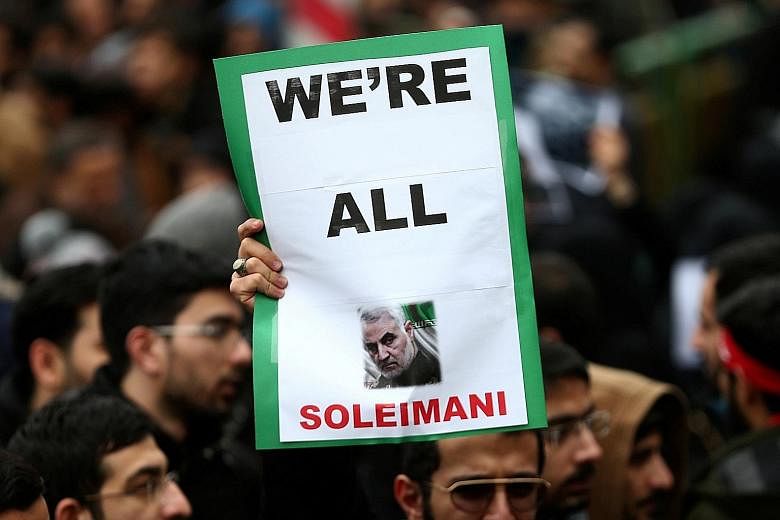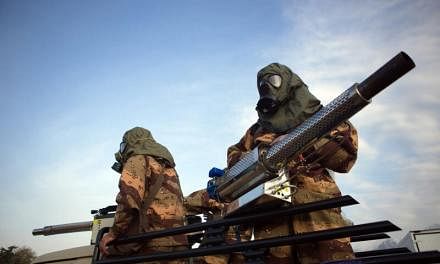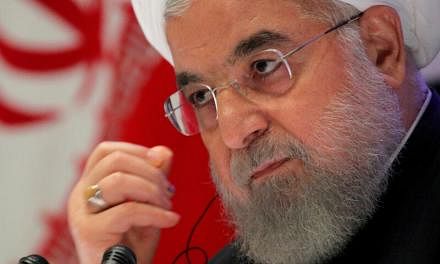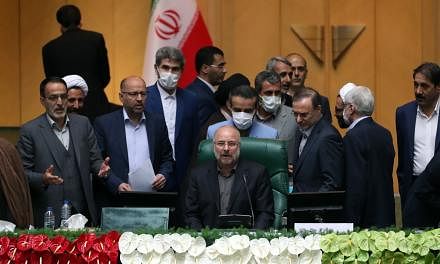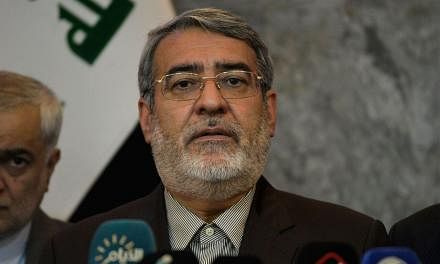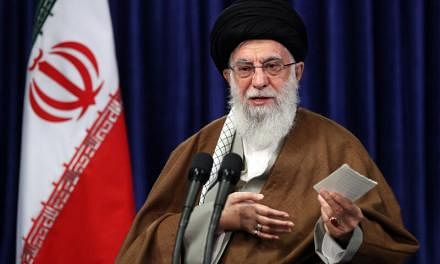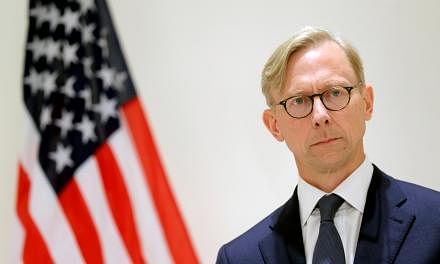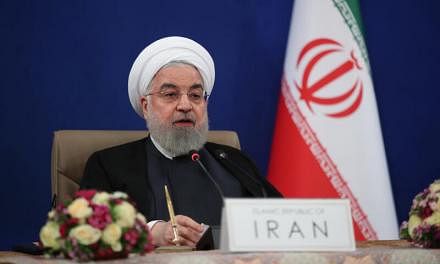TEHERAN • The body of Major-General Qassem Soleimani, who was killed in a US drone strike, arrived yesterday in Iran to throngs of mourners, as US President Donald Trump threatened to bomb 52 sites in the Islamic Republic if Teheran retaliates by attacking Americans.
The US Embassy in Saudi Arabia separately warned Americans "of the heightened risk of missile and drone attacks".
Meanwhile, Iran vowed to take an even greater step away from its unravelling nuclear deal while Iraqi MPs have asked foreign troops to leave the country.
The US drone strike killing of Maj-Gen Soleimani in Iraq last Friday has escalated tensions between Teheran and Washington which have been trading attacks and threats that put the wider Middle East on edge.
The crisis is rooted in Mr Trump's pulling out of Iran's atomic accord.
Iran has promised "harsh revenge" for the US attack, which shocked Iranians across all political lines. Many saw Maj-Gen Soleimani as a pillar of the Islamic Republic at a time when it is beset by US sanctions and anti-government rallies.
Retaliation for the killing of Maj-Gen Soleimani could potentially come through the proxy forces which he oversaw as the head of an elite unit within the paramilitary Revolutionary Guards.
Late last Saturday, a series of rockets launched in Baghdad fell inside or near the Green Zone, which houses government offices and foreign embassies, including the US Embassy.
Mr Trump wrote on Twitter afterwards that the US had already "targeted 52 Iranian sites (representing the 52 American hostages taken by Iran many years ago), some at a very high level & important to Iran & the Iranian culture".
Mr Trump did not identify the targets but added that they would be "HIT VERY FAST AND VERY HARD".
The 1954 Hague Convention, of which the US is a party, bars any military from "direct hostilities against cultural property".
However, such sites can be targeted if they have been repurposed and turned into a legitimate "military objective", according to the International Committee of the Red Cross. Iran is home to 24 Unesco World Heritage sites.
US Secretary of State Mike Pompeo yesterday said any target the US military may strike in Iran, in the event Iran retaliates against America for killing its most powerful general, would be legal under the laws of armed conflict.
"We'll behave lawfully. We'll behave inside the system," Mr Pompeo told the ABC network's This Week programme.
In another development, Iraq said yesterday that it had submitted complaints to the United Nations Security Council over US strikes on Iraq that killed the Iranian general, an Iraqi commander and other local forces. The foreign ministry said it had submitted two letters to the UN and asked the Security Council to condemn the "assassination" of Maj-Gen Soleimani.
The Iraqi Parliament also passed a resolution asking the government to cancel the request for assistance from the US-led coalition.
They called for foreign troops to leave the country and for a ban on foreign forces using Iraqi land, airspace or water.
The US has some 5,000 military personnel in Iraq, mainly as advisers, the BBC reported.
In Baghdad last Saturday, after thousands mourned Maj-Gen Soleimani and others killed in the strike, the authorities flew his body to the south-western Iranian city of Ahvaz. An honour guard stood by early yesterday as mourners carried the flag-draped coffins of Maj-Gen Soleimani and other Guard members off the tarmac. The caskets then moved slowly through streets choked with mourners wearing black, beating their chests and carrying posters with Maj-Gen Soleimani's portrait.
Officials brought Maj-Gen Soleimani's body to Ahvaz, a city that was a focus of fighting during the bloody, 1980-1988 war between Iraq and Iran, in which the Major-General slowly grew to prominence. The authorities took Maj-Gen Soleimani's body to Mashhad later yesterday. His remains will be transported to Teheran and Qom today for public mourning processions, followed by burial in his hometown of Kerman tomorrow.
This is the first time Iran is honouring a single man with a multi-city ceremony.
Not even Ayatollah Ruhollah Khomeini, the Islamic Republic's founder, received such a processional with his death in 1989. Maj-Gen Soleimani today will lie in state at Teheran's famed Musalla mosque as the revolutionary leader did before him.
Though it is unclear how or when Iran may respond, any retaliation is likely to come after three days of mourning declared in Iran and Iraq.
Iranian officials were planning to meet last night to discuss taking a fifth step away from its 2015 nuclear deal with world powers, one that could be even greater than planned, Foreign Ministry spokesman Abbas Mousavi told journalists. "In the world of politics, all developments are interconnected," Mr Mousavi said.
Iran has previously broken limits of its enrichment, its stockpiles and its centrifuges, as well as restarted enrichment at an underground facility. After the airstrike early last Friday, the US-led coalition has scaled back operations and boosted "security and defensive measures" at bases hosting coalition forces in Iraq.
The US has dispatched another 3,000 troops to neighbouring Kuwait, the latest in a series of deployments in recent months as the stand-off with Iran has worsened.
Protesters held demonstrations in dozens of US cities last Saturday over Mr Trump's decisions to kill Maj-Gen Soleimani and deploy more troops to the Middle-East.
The Iranian Parliament yesterday opened with lawmakers in unison chanting: "Death to America!"
Parliament Speaker Ali Larijani compared Maj-Gen Soleimani's killing to the 1953 CIA-backed coup that cemented the Shah's power and to the US Navy's shooting down of an Iranian passenger plane in 1988 that killed 290 people.
ASSOCIATED PRESS, REUTERS
SEE OPINION

